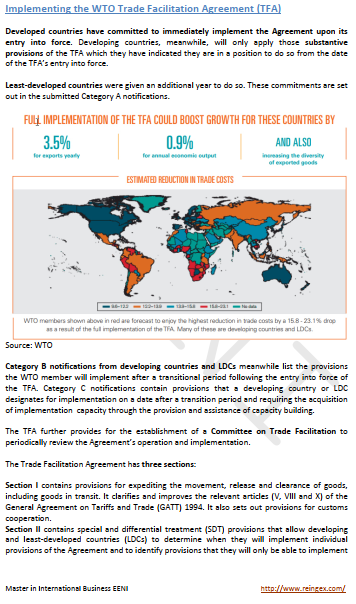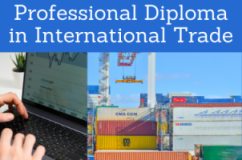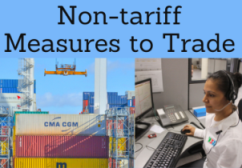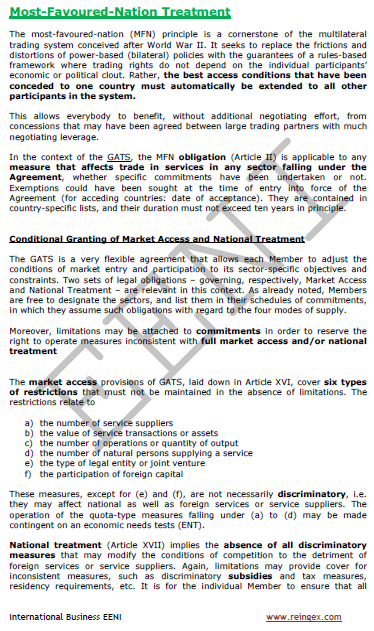Customs. Rules of origin. Tariffs (WTO)
Import licensing procedures. Customs Valuation. Preshipment inspection

Customs valuation is a procedure applied by Customs to find out the “Customs value of imported products.”
In the case that rate of duty is “ad valorem,” customs value is necessary to find out the duty to be paid on an imported product.
For importers, the process of estimating the value of a product at customs can present some troubles.
The World Trade Organization (WTO) Agreement on Customs Valuation objectives for a fair, uniform and neutral system for Customs Valuation.
- Role of WTO in Customs Procedures
- Multilateral Trading System
- World Trade Organization Agreements
- Tariffs
- Agriculture
- Standards and safety
- Textiles
- Anti-dumping, subsidies, and safeguards
- Non-tariff barriers
- Agreement on Import Licensing Procedures
- Agreement on Customs Valuation
- Customs Valuation Rules
- Customs Valuation Methods:
- Transaction value
- Identical or similar goods
- Deductive or computed method
- Fall-back
- Pre-shipment Inspection Agreement
- Rules of Origin Agreement
- Trade Facilitation
- Customs and Regional Trade Agreements
- Customs Procedures and the Doha agenda
- Trade Restrictions
Sample:
The educational aims of the Subject “Customs and WTO” are to understand the:
- Role of WTO in Customs Procedures
- WTO Agreements
- Fundamental concepts related to customs: non-tariff barriers, customs valuation, transaction value, pre-shipment inspection, rules of origin, and import licences
- Customs Valuation Methods

The Subject “Customs and WTO” is included within the curriculum of the following academic programs at EENI Global Business School:
Postgraduate Certificate in International Trade.

Masters: International Business, Foreign Trade, International Transport.


Languages:  or
or  Douanes
Douanes  Aduanas
Aduanas  Alfandegas.
Alfandegas.
Import licensing
In Foreign Trade, import licensing are the administrative procedures that need the compliance of documentation to the administrative organization as a previous condition for importation of products.
The Agreement on Import Licensing Procedures of WTO refers to “import licensing should be simple, transparent and predictable.”
The World Trade Organization Agreement on Customs Valuation defines that customs valuation should (excluding in specified circumstances) be based on the actual price of the Products (usually marked on the invoice).
The following six methods are considered in WTO Agreement on Customs:
- Transaction value
- Transaction value of identical products
- Transaction value of similar products
- Deductive method
- Computed method
- Fall-back method
Transaction value is the price paid by the importer to benefit of the exporter for imported products.
Pre-shipment inspection
When the exporter or the importer outsource to specialized private enterprises to control shipment details (price, quantity, and quality) of the products.
The Pre-shipment Inspection Agreement recognizes that GATT principles and obligations apply to these pre-shipment activities.
Sample - Customs and WTO

Rules of Origin
The “Rules of origin” define where a product was produced. The concept of rules and certificate of origin is a fundamental pillar of International Trade rules (quotas, preferential Tariffs, anti-dumping, or counter export subsidies).

Related Subjects:
- Non-tariff Measures
- Sanitary and Phytosanitary Measures
- Technical Barriers to Trade
- Anti-dumping Measures and Safeguards
- Import Licensing and Quotas
- Pre-shipment Inspection
- Istanbul Convention

(Source: World Trade Organization).
(c) EENI Global Business School (1995-2025)
Top of this page










 WhatsApp
WhatsApp